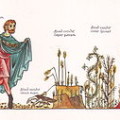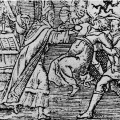The First Prediction of the Passion.
22 He said, “The Son of Man must suffer greatly and be rejected by the elders, the chief priests, and the scribes, and be killed and on the third day be raised.”
Recall that we previously discussed how Jesus habitually tried to suppress the perception that He is the Messiah. (See the reflection on Luke 4:40, 41; Other Healings; Cultural – Who is the Messiah?) Central to that discussion was the assertion that Jesus wasn’t the kind of Messiah anyone would have expected. Now that He has made clear to His disciples that He is indeed the Messiah – they can have no doubt – He tells them He has to suffer greatly, be rejected and be killed. At this proclamation we would expect them all to object. They would say something like “No way! There’s just no way the Messiah can be killed.”
If we read the account of this prediction in Matthew we will see that Peter does indeed object. We won’t go into that here. It’s better for us to consider the same question the disciples must have been pondering. How can the Messiah be made to suffer? Who would inflict harm, and why? Why would the elders, priests, and scribes reject him? Why would he be killed? How can I believe in a Messiah that gets killed?
Even though we know the answer to these questions they still, even today, merit prayerful reflection. Why would God incarnate have to suffer? Why would God incarnate be rejected by the religious leaders? Why would God incarnate have to die?
Related PostsScripture texts in this work are taken from the New American Bible, revised edition© 2010, 1991, 1986, 1970 Confraternity of Christian Doctrine, Washington, D.C. and are used by permission of the copyright owner. All Rights Reserved. No part of the New American Bible may be reproduced in any form without permission in writing from the copyright owner.




